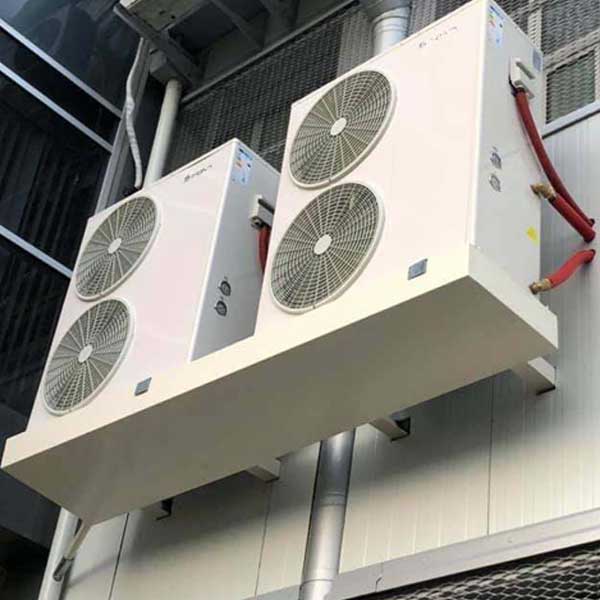Views: 425 Author: Site Editor Publish Time: 2021-04-08 Origin: Site
Many homeowners will install a heat pump in order to save money. However, a primary concern that may arise is the noise level. Chances are that you don't want a heat pump in your home that is going to be loud inside or outside. Although most heat pumps functioning properly don't make much noise, you can now have a better idea of what noise level to expect.
When functioning properly, an indoor heat pump is going to be about 17-26 decibels. This measurement probably isn't that useful if you don't know what decibels correspond to in terms of noise. Each system is going to have a slightly different noise rating so it's best to always check the manufacturing guide on a heat pump before purchasing.

The decibel level on an indoor heat pump is comparative to the rustling of leaves. You may hear the heat pump turn off and on but you likely won't be bothered. If turning on at night, it's unlikely that the noise would even wake you up. The noise that the unit makes is related to the speed of the fan. When working at a high speed, the pump will be slightly louder. However, since the average pump works at a slow and steady pace, it's not common for the fan speed to be set on high.
The outdoor unit's noise level is going to be higher though. Outdoor units in general tend to be louder but it should never be loud enough to bother yourself or your neighbor. If you're outside working in the yard and the pump is working, you'll probably hear it but it is low enough to comfortably talk and even stand next to the pump. It certainly should not be loud enough to bother you or your neighbors.
The only time when your outdoor unit may be slightly loud is when it's in the defrost mode. This is a setting that your outdoor unit uses in order to melt accumulated snow. Any snow and ice that buildups on the unit can have a negative effect on the fan, requiring it to run louder or even burn out over time. The defrost mode will turn on occasionally, especially in the winter months but should not be running constantly.
If you're concerned about the heat pump being too noisy, there are a few primary reasons why this happens.
Most people won't tend to notice when their heat pump turns off and on. This is usually due to its placement on installation. A good contractor will place the heat pump in a location where it won't bother you turning off and on. Some of the compressor units on a heat pump can make a louder sound when they turn off and on. This noise can be on the louder side but will only last a few minutes. You may notice this when the pump turns off and on but take note if it lasts longer than a few minutes.
When the heat pump is moving warm air into the house, the cooled air outside of the pump is going to condense on the coils. This freezing action will make the heat pump less efficient. When your system notes that frost buildup has occurred, the heat pump will switch into the defrost mode for a few minutes. This may be accompanied by a louder noise but you can expect this to only last for a few minutes before turning to its normal operations.
If you notice that your heat pump has a gentle buzzing or humming noise as it runs, this is not a typical reason for concern. Each unit runs at a slightly different sound level. The coils and contactors in the heat pump are going to make a slight noise as electricity is transferred through them. In general, people don't describe this noise as being disruptive. Take note though if you notice the noise getting louder over time or find it disruptive.
The movement of air through the heat pump is how it gets warm air into the home. This air movement is prompted by a large fan that's located on the top of the pump. When it runs at a normal speed, it will emit a slight noise but this is typically not very loud. The noise that the fan makes should be consistent and not too loud. You may also hear a clicking noise right before it turns on. If you make a significant change in your home's temperature, the fan may run at a higher speed temporarily which will also make it louder. This is not extremely common though.
Homeowners can be proactive when it comes to their home heat pumps by paying attention to its normal noises and taking note if there are any unusual sounds. If you start hearing some strange noises, then take note. A loud squealing noise, for example, usually means that your system needs a new discharge valve. A clanking or metal on metal noise is also cause for concern and typically means that something is wrong with the system. Overall, any unusual or loud noises should prompt you to investigate further. It's recommended that when you notice these signs, it's best to call a professional since trying to repair the problem on your own may make it worse rather than resolve the problem.
Since most heat pumps will need servicing periodically, make sure to call a professional promptly when you start to notice any unusual noises. You probably can't make the unit quiet on your own but describe the noises to an HVAC professional. They may recommend that you turn the unit off until it can be serviced. The best treatment is always preventative so scheduling regular maintenance and inspection is recommended for heat pumps. Take note of these noises and if they're normal to experience or not.
Also of Interest:
2021-12-06
2022-01-07
2021-10-30
2021-11-30
